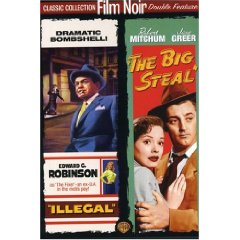
The Big Steal (1949) Directed by Don Siegel
Starring Robert Mitchum, Jane Greer, William Bendix, Ramon Novarro, Patric Knowles
Blending the sarcastic interplay of a romantic-comedy with the punch and thrills of a fast-paced action flick The Big Steal was surprisingly entertaining. There’s a chemistry between Mitchum and Greer (previously seen together in the noir classic Out of the Past) that, while it falls short of Bogart and Bacall’s, has an undeniable charm which carries throughout the movie from their acrimonious introduction to their inevitable romance; interestingly Greer was late in signing on, taking the role as a favor to Mitchum who was having trouble following a marijuana bust. The supporting cast, particularly Novarro, all rise to the occasion whether alone or sharing the screen with the stars. Vibrant performances elevate what would otherwise have been a dime a dozen adventure to a giddy romp without straying into cheaps laughs or rote violence.
It’s not all fun and games, however, it’s a whodunnit. Captain Blake (Bendix) is gunning for Duke Halliday (Mitchum) who is accused to stealing hundreds of thousands in an army payroll heist. Halliday maintains that the money was actually stolen by pretty-boy Jim Fiske (Knowles) but no one believes him, even Fiske’s jilted fiancee Joan Graham (Greer) who’s just disembarked in Veracruz hunting after her vanished betrothed and the couple thousand he’d borrowed. Halliday ducks the pinch and heads after Fiske assuming Blake’s identity, bumping heads with Graham along the way. Graham catches Fiske as he’s setting out on a delivery job and holds the package while he arranges a car. Halliday finds Graham, drags her after Fiske and Fiske takes off out of town leaving Halliday in the dirt and Graham wondering if what Halliday (posing as Blake) says is true. Before they can find out the local police get involved and both Graham and Halliday find themselves before Inspector General Ortega (Novarro), an eager student of English under the tutelage of his Lt. Ruiz and a cunning detective behind his quick smile. Fiske is burning rubber to make his drop, Halliday and Graham are both hot on his trail, Blake is hot on theirs and Ortega and Ruiz are curious to see where this is all going. (more…)


